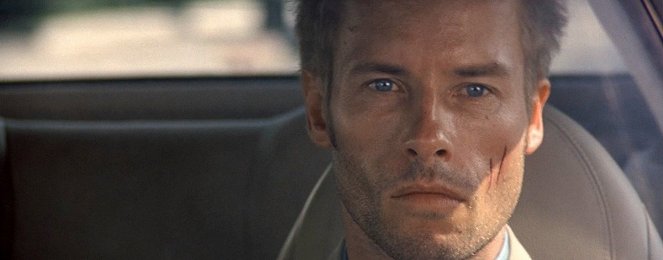Directed by:
Christopher NolanScreenplay:
Christopher NolanCinematography:
Wally PfisterComposer:
David JulyanCast:
Guy Pearce, Carrie-Anne Moss, Joe Pantoliano, Mark Boone Junior, Jorja Fox, Stephen Tobolowsky, Harriet Sansom Harris, Thomas Lennon, Callum Keith Rennie (more)Plots(1)
A man suffers from short term memory loss since his wife's murder. He is left with a head injury that limits his communicaton skills. By taking pictures and tattoing himself with notes, he attempts to find his wife's killer. (Pathé Distribution UK)
Videos (1)
Reviews (12)
When your life becomes a point-and-click adventure and you find yourself again and again in unfamiliar places, where you try to figure out what to do with the aid of the objects that you have with you and around you... Leonard’s only “data repository” is his own body (not his mind), on which he has important information tattooed (an extension of his body is a Polaroid camera, which he uses to take pictures of the people entering his life and which therefore replaces his visual memory). His identity is based only on what he has written down and what can be interpreted in conflict with the original meaning, which is perhaps an even more relevant theme today, in an age when we let our lives be controlled by smartphones, than it was at the turn of the millennium. The expression of uncertainty in the relationship of the “self” to itself and to the outside world comprises only one of the levels of inspiration in Nolan’s ambitious updating of noir conventions for the (post)modern era (the formalistically unique films of European modernist cinema served him well in this regard). The director’s aim was to put us in the position of a man with no short-term memory. The narrative perspective is fixed on Leonard throughout the film. We see and hear only what he sees and hears. The protagonist does not remember what happened a few minutes ago and because of the non-chronological narrative, we don’t know either. Because we know the future, however, we can piece together the overall picture more easily than Leonard can. We gradually assign causes to the consequences of events and try to arrange events in chronological order in our minds, which is a slightly more demanding thought process requiring a different schematic than in the case of a standard narrative running from point A to point B. On the other hand, the linearity of the film (which makes Memento different from Following with its scenes in a jumbled sequence) makes our work easier. The individual scenes in the colour and black-and-white storylines build on each other. The former runs backwards and the latter forward in the standard way (and though it pretends to be a more objective record of reality, it contains flashbacks that are not entirely reliable), so that they intersect in the climax, which is strikingly reminiscent of the beginning and thus draws attention to the hopeless cyclicity of Leonard’s situation. At the same time, the two storylines are complementary in many ways and help us to understand the protagonist’s situation and his objective relatively early in the film. If Memento ran chronologically, it would lose a substantial part of its mysterious nature, unravelling the mystery would be a much smaller challenge and the themes of remembering, forgetting and the flow of time would not have been incorporated directly into the structure of the film. In other words, the complexity of the narrative is not an end in itself, but a determinative feature. 90%
()
Brilliant! Without doubt, this is the only film that would make more sense than the usual if you watched it from the end to the beginning. But then it would be a only boring and routine crime drama instead of a perfect example of smart filmmaking with an excellent script and a totally unpredictable ending (well, beginning). Guy Pearce, a total unknown to me, shines and Christopher Nolan gets more bonus points – and a lot of them!
()
Although I was a little bothered by the fact that it comes across as aimless, maybe it's because the movie ultimately still tries to convey something more, this is so brilliantly directed, edited, and executed that I simply don't have much else to criticize. I was blown away by the film and its structure the first time, and I still am the second time, and I will probably be many more times.
()
What a weird film. The story is actually told backwards, so I got to know how everything was going to end right in the beginning, and yet I was entertained all along as it was gradually revealed to me why all those things happened. The filmmakers managed to create a somewhat paranoid atmosphere and bring suspense and the effect of deja-vu to an already resolved story. I even had a decent laugh in the moments before the main character realized what was going on.
()
Memento has just a few blemishes on its beauty; bland music, two logic hiccups and one or two other problems. But they are just tiny little spots and the in essence simple screenplay is genius storytelling. I wouldn’t compare it to the Czech movie Happy End; Memento doesn’t go backwards, it’s just the individual chapters that go backwards here. Nolan proved that, even with minimum resources, it’s possible to shoot a thriller of genius if you have good screenplay combined with inventive directing.
()



Ads